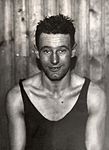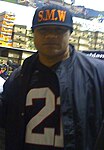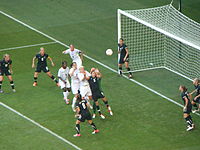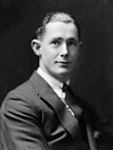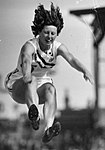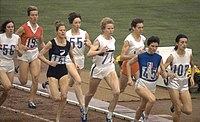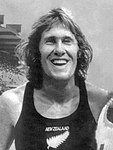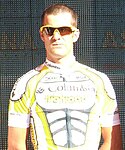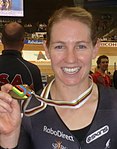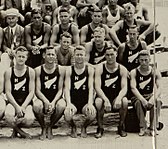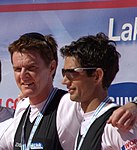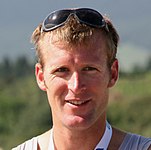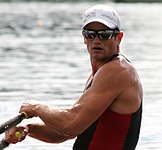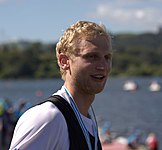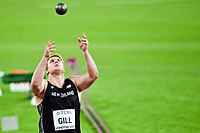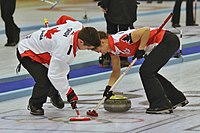Olympic history of New Zealand
|
|
|
|
|---|---|---|
| 46 | 28 | 46 |
New Zealand , whose NOK , the New Zealand Olympic Committee , was founded in 1911, has participated in all summer games since 1920. In 1908 and 1912, Australian and New Zealand athletes competed together under the name Australasia . New Zealand was first represented at the Winter Games in 1952. With the exception of 1956 and 1964, New Zealand athletes were sent to all subsequent Winter Games. Young athletes have been sent to all of the Youth Olympic Games that have been held so far.
General

New Zealand has been represented at the Olympic Games since 1920. However, the first New Zealander to attend the Olympic Games was in Paris in 1900, before New Zealand became a British Dominion . In a typical mixed team at the time, Victor Lindberg competed in water polo. He was a team member of the British Osborne Swimming Club from Manchester , which took part in the Olympic water polo tournament. Lindberg was used in a preliminary round match against the French club Tritons Lilloise . The game was won 12-0. The British team later won the gold medal, making Lindberg the first New Zealand medalist and Olympic champion. Since he did not start for a New Zealand NOK, but for a British club, Lindberg is not counted as a member of a New Zealand Olympic team.
The first New Zealand Olympian to be a member of a New Zealand Olympic team was the track and field athlete George Davidson on August 15, 1920. On August 23rd, New Zealand's first woman swimmer Violet Walrond took part in the Olympic Games.
New Zealand's first medalist was rower Darcy Hadfield in 1920 , who won the bronze medal in the single. The country's first Olympic champion was boxer Ted Morgan in Amsterdam on August 11, 1928 , who won the welterweight contest. The first woman in New Zealand to win an Olympic medal was track and field athlete Yvette Williams in 1952 . In Helsinki she won the long jump, making her the first New Zealand Olympic champion.
The ski racer Annette Johnson was New Zealand's first female winter Olympic athlete on February 14, 1952. A day later, Herbert Familton and William Hunt were followed by the first men. New Zealand has so far won a medal at the Winter Olympics. 1992 in Albertville Annelise Coberger won silver in the slalom. This silver medal was the first winter medal won by an athlete from the southern hemisphere.
New Zealand's participation in the 1976 Summer Games led to a boycott of 16 African countries because the New Zealand national rugby union team violated the international sports ban against the apartheid state of South Africa and competed there.
New Zealand's most successful athletes are canoeists. Ian Ferguson and Paul MacDonald won five medals each in 1984 and 1988. While Ferguson won four gold and one silver medal, MacDonald won three gold, one silver and one bronze medal. The rider Mark Todd also won five medals. He won two gold and three bronze medals. The track and field athlete Peter Snell was three times Olympic champion. He was the first New Zealand double Olympic champion in Tokyo in 1964.
Rowing and athletics are the most successful sports in New Zealand. 24 medals were won in both sports. Eleven gold, three silver and ten bronze medals were won in rowing, ten gold, three silver and eleven bronze medals in athletics. Just behind both sports is sailing, the third most successful sport. New Zealand sailors were able to win 22 medals, including nine gold, seven silver and six bronze medals.
Most Olympic victories (eight) came in 1984 in Los Angeles. Most of the medals (18) were won in 2016 in Rio de Janeiro, including four gold, nine silver and five bronze medals.
New Zealand has three IOC members. In 2010, former hockey player Barry Maister , 1976 Olympic champion, was elected a member of the IOC. He is a member of the Olympic Education and Program Commissions. BMX rider Sarah Walker , 2012 silver medalist, followed in 2016. She is a member of the Commission for Sustainability and Legacy, the Commission for Women's Sports and the Athletes Commission.
Overview of the participations
Summer games
| year | Athletes | Flag bearer | Medals | ||||||
|---|---|---|---|---|---|---|---|---|---|
| total | m | w |
|
|
|
total | rank | ||
| 1896-1912 | not participated | ||||||||
| 1920 | 4th | 3 | 1 | Harry Wilson | 1 | 1 | 22nd | ||
| 1924 | 4th | 3 | 1 | Arthur Porritt | 1 | 1 | 23 | ||
| 1928 | 9 | 61 | 3 | Arthur Porritt | 1 | 1 | 24 | ||
| 1932 | 21st | 20th | 1 | John MacDonald | 1 | 1 | 22nd | ||
| 1936 | 7th | 7th | 0 | Jack Lovelock | 1 | 1 | 20th | ||
| 1948 | 7th | 6th | 1 | Harold Nelson | |||||
| 1952 | 14th | 12 | 2 | Harold Cleghorn | 1 | 2 | 3 | 24 | |
| 1956 | 51 | 43 | 8th | Richard Johnston | 2 | 2 | 16 | ||
| 1960 | 37 | 33 | 4th | Les Mills | 2 | 1 | 3 | 14th | |
| 1964 | 64 | 56 | 8th | Peter Snell | 3 | 2 | 5 | 12 | |
| 1968 | 52 | 47 | 5 | Donald Oliver | 1 | 2 | 3 | 27 | |
| 1972 | 89 | 82 | 7th | Les Mills | 1 | 1 | 1 | 3 | 23 |
| 1976 | 80 | 71 | 9 | David Aspin | 2 | 1 | 1 | 4th | 18th |
| 1980 | 4th | 4th | 0 | Brian Newth | |||||
| 1984 | 130 | 98 | 32 | John Walker | 8th | 1 | 2 | 11 | 8th |
| 1988 | 83 | 67 | 16 | Ian Ferguson | 3 | 2 | 8th | 13 | 18th |
| 1992 | 134 | 92 | 42 | Mark Todd | 1 | 4th | 5 | 10 | 28 |
| 1996 | 95 | 66 | 29 | Barbara Kendall | 3 | 2 | 1 | 6th | 26th |
| 2000 | 147 | 77 | 70 | Blyth Tait | 1 | 3 | 4th | 46 | |
| 2004 | 148 | 81 | 67 | Beatrice Faumuina | 3 | 2 | 5 | 24 | |
| 2008 | 178 | 96 | 82 | Mahé Drysdale | 3 | 2 | 4th | 9 | 25th |
| 2012 | 178 | 96 | 82 | Nick Willis | 6th | 2 | 5 | 13 | 15th |
| 2016 | 195 | 98 | 97 | Peter Burling | 4th | 9 | 5 | 18th | 19th |
Winter games
| year | Athletes | Flag bearer | Medals | ||||||
|---|---|---|---|---|---|---|---|---|---|
| total | m | w |
|
|
|
total | rank | ||
| 1924-1948 | not participated | ||||||||
| 1952 | 3 | 2 | 1 | Austin Hayward | |||||
| 1956 | not participated | ||||||||
| 1960 | 4th | 2 | 2 | William Hunt | |||||
| 1964 | not participated | ||||||||
| 1968 | 6th | 4th | 2 | Thomas Huppert | |||||
| 1972 | 2 | 2 | 0 | Alan Ward | |||||
| 1976 | 5 | 3 | 2 | Stuart Blakely | |||||
| 1980 | 5 | 3 | 2 | Stuart Blakely | |||||
| 1984 | 6th | 4th | 2 | Markus Hubrich | |||||
| 1988 | 9 | 7th | 2 | Simon Wi Rutene | |||||
| 1992 | 6th | 5 | 1 | Christopher Nicholson | 1 | 1 | 17th | ||
| 1994 | 7th | 5 | 2 | Tony Smith | |||||
| 1998 | 8th | 4th | 4th | Peter Henry | |||||
| 2002 | 10 | 7th | 3 | Angela Paul | |||||
| 2006 | 15th | 10 | 5 | Sean Becker | |||||
| 2010 | 16 | 9 | 7th | Juliane Bray | |||||
| 2014 | 14th | 6th | 8th | Shane Dobbin | |||||
| 2018 | 21st | 17th | 4th | Beau-James Wells | 2 | 2 | 26th | ||
Youth Summer Games
| year | Athletes | Flag bearer | Medals | ||||||
|---|---|---|---|---|---|---|---|---|---|
| total | m | w |
|
|
|
total | rank | ||
| 2010 | 57 | 22nd | 35 | Jacko Gill | 1 | 2 | 1 | 4th | 38 |
| 2014 | 50 | 29 | 21st | 2 | 1 | 2 | 5 | 34 | |
Youth Winter Games
| year | Athletes | Flag bearer | Medals | ||||||
|---|---|---|---|---|---|---|---|---|---|
| total | m | w |
|
|
|
total | rank | ||
| 2012 | 15th | 9 | 6th | Beau-James Wells | |||||
| 2016 | 11 | 8th | 3 | Finn Bilous | 1 | 1 | 2 | 22nd | |
Overview of the sports
Summer games
badminton
|
|
|
|
|---|---|---|
| - | - | - |
The first New Zealand badminton players started in Barcelona in 1992. Further participations took place in 1996, 2004 and 2008. All the participants were unsuccessful.
basketball
|
|
|
|
|---|---|---|
| - | - | - |
New Zealand teams first took part in the 2000 Olympic tournaments in Sydney. Both men and women could not win any of their games and were eliminated as the bottom of the group. In 2004, the men won a game for the first time (90:87 over Serbia-Montenegro), but lost their game for 9th place against Australia with 80:98. The women even won two of their preliminary round games (against China and South Korea), but failed in the quarterfinals with 55:94 to Australia and lost the game for 7th place against Greece with 83:87. In Beijing in 2008, only women qualified. They could only win one game in the preliminary round against Mali. Since no placement round was played, the team was ranked 10th.
Beach volleyball
|
|
|
|
|---|---|---|
| - | - | - |
The first Olympic beach volleyball tournament with New Zealand participation took place at the 1996 Olympic premiere of the sport in Atlanta. It was also the only participation of a New Zealand duo.
Archery
|
|
|
|
|---|---|---|
| - | - | - |
The first Olympic archer in New Zealand competed in the 1972 tournament in Munich. Other participations took place between 1984 and 2000. None of the athletes could qualify for another round.
Boxing
|
|
|
|
|---|---|---|
| 1 | 1 | 1 |
New Zealand's first boxer competed in Paris in 1924. In 1928 in Amsterdam, Ted Morgan became an Olympic welterweight champion. Ted Morgan was the first Olympic champion in New Zealand's Olympic history. Only 56 years later, in 1984 in Los Angeles, should the next medal win take place. Kevin Barry won silver in the light heavyweight division . Kevin Barry had to leave the Olympic victory to the Yugoslav Anton Josipović without a fight , as Barry knocked out in the semifinals against the US boxer Evander Holyfield . had gone. However, since the precipitation came after the final gong, Holyfield was disqualified and Barry declared the winner. David Tua won the bronze medal in the heavyweight division in Barcelona in 1992.
| Surname | Games | discipline | annotation |
|---|---|---|---|
| Ted Morgan | 1928 Amsterdam | Welterweight | first ever Olympic champion for New Zealand |
| Surname | Games | discipline | annotation |
|---|---|---|---|
| Kevin Barry | 1984 Los Angeles | Light heavyweight |
| Surname | Games | discipline | annotation |
|---|---|---|---|
| David Tua | 1992 Barcelona | Heavyweight |
fencing
|
|
|
|
|---|---|---|
| - | - | - |
The first New Zealand fencer started in Rome in 1960. The greatest success was recorded in 1988 in Seoul by Martin Brill, who achieved 7th place in the individual ranking with his sword.
Soccer
|
|
|
|
|---|---|---|
| - | - | - |
New Zealand first participated in an Olympic soccer tournament in 2008. Both a men's and a women's team had qualified. The men's team was eliminated after only one draw against China after the preliminary round. The women's team also only reached a draw against Japan and was eliminated.
Also in 2012 the men only came to a draw, this time against Egypt, and failed in the preliminary round. The women achieved their first victory at an Olympic tournament with a 3-1 win against Cameroon and thus qualified for the quarter-finals. Here they were defeated by the USA with 0-2.
In 2016 only the women were qualified. Colombia were defeated 1-0, but this one victory was not enough this time to advance. The team was eliminated after the preliminary round.
2012 preliminary match against the United Kingdom: Goalkeeper Jenny Bindon in action
Weightlifting
|
|
|
|
|---|---|---|
| - | - | - |
New Zealand weightlifters competed for the first time in London in 1948. None of the athletes could achieve a better placement than 7th place.
golf
|
|
|
|
|---|---|---|
| - | - | - |
Three New Zealand golfers, two men and one woman, competed at the 2016 Olympic golf tournament in Rio de Janeiro. Lydia Ko won the silver medal in the women's tournament.
| Surname | Games | discipline | annotation |
|---|---|---|---|
| Lydia Ko | 2016 Rio de Janeiro | Ladies tournament | first medal win |
hockey
|
|
|
|
|---|---|---|
| 1 | - | - |
The first Olympic hockey tournament with New Zealand participation took place in Melbourne in 1956. The men's team lost in the preliminary round to Pakistan 1: 5 and Germany 4: 5. A win over Belgium (3-0) brought the team into the placement round for places 5 to 8. Two wins and one loss against Australia meant group place 2 and place 6 of the tournament.
In the 1960 tournament, New Zealand and the Netherlands were tied in second place. In the playoff, New Zealand won 2-1 and advanced to the quarter-finals. Here the team lost to Spain 0-1 after extra time. In the placement round, Germany and Australia were each beaten 1-0, which meant fifth place in the final standings.
The 1964 tournament turned out to be a disappointment. In six preliminary round games, the team could only win one win against the United Kingdom. The last of the group was eliminated. In 1968 they were more successful. Two wins and three draws, including a 0-0 against the Federal Republic of Germany and a 1-1 against the GDR, meant third place in the preliminary group. This qualified for the placement round of places 5 to 8. The game against the Netherlands was lost 3-1, the game for 7th place against Kenya was won 2-0. In 1972 in Munich, two wins and three draws were only enough for fourth place in the preliminary group. The final game for 9th place against Belgium was won 2-1.
The greatest success was achieved in 1976 in Montreal. After one win and two draws, including a 1-1 draw against the Federal Republic of Germany, a play-off with the Spaniards tied for second place had to be played. New Zealand won the game 1-0 after extra time. In the semi-finals, the Netherlands were then beaten 2-1 after extra time. In the final, New Zealand met Australia. New Zealand won 1-0, becoming an Olympic hockey champion for the first time.
1984 in Los Angeles for the first time a women's team took part. With one win and two draws, the men finished fourth in their preliminary group. That was enough for the placement round for places 5 to 8. The first game against India was lost 1-0, in the game for 7th place Spain was defeated 1-0. The women could not win any of their games and finished sixth and last in the ranking without winning points.
Both teams did not participate again until 1992 in Barcelona. The men managed only one win against the United Team of the Former Soviet Republics, but finished fourth in the group due to the better goal difference. In the placement round, the first game against the United Kingdom was lost 3-2. New Zealand also lost the game for 7th place against India 2: 3. The women were again unable to win any of their preliminary round matches and, due to the poorer goal difference compared to Canada, placed fourth in the other group, eighth and last in the ranking.
2000 in Sydney only the women's team was qualified. In the first group game against Germany, the women's team won the first point with a 1-1 draw. In the second game, China was defeated 2-0, the first victory for a women's team. Another win against South Africa and two draws followed. This made the New Zealand team first in the group. In the following three games of the medal group, the team managed only one draw against Spain. The team finished 6th in the final ranking.
In 2004 in Athens the men were there again. With three victories in the preliminary round, the men qualified for the placement round for places 5 to 8. Against South Korea there was a 4: 3 victory, the game for place 5 against Pakistan was lost 2: 4. The women managed only one victory against Spain, they finished 4th in the preliminary round. In the placement round, South Korea was beaten 3-2 after extra time. The game for 5th place against Australia was lost 3-0.
In 2008 in Beijing, the men had two wins and one draw. They lost 3-1 to Germany. With 4th place in the preliminary round it was now the game for 7th place against Pakistan, which New Zealand won 4-2. The women could not win any of their preliminary round matches, so there was a 1: 2 defeat against Germany. The game for 11th place against South Africa was also lost 4-1.
At the 2012 London tournament, the men had one win and two draws. Against Germany they fought 5: 5 on the last day of the preliminary round. The New Zealanders won the game for 9th place against Argentina 3-1. The women were far more successful. With three wins and a 0-0 win against Germany, the team qualified for the semi-finals. The game against the Netherlands went into the seven-meter shootout after a 2-2 win in extra time. The New Zealanders finally lost the duel 3: 5. The game for the bronze medal against the United Kingdom was then lost 3-1. The fourth place meant the best result of a women's team to date.
In 2016 in Rio de Janeiro, the men achieved two wins and one draw and thus fourth place in the preliminary group. In the quarter-finals, the German team lost 2: 3. New Zealand was in the lead 2-1 until the final minute. The German team equalized 42 seconds before the end, the winning goal for Germany fell just one and a half seconds before the final whistle. In the preliminary round, the women took second place in the group with three wins and one draw. The group game against Germany was lost 2-1. A 4-2 victory over Australia followed in the quarter-finals. In the semi-finals, the United Kingdom lost 3-0. In the bronze match it was again against Germany and again the Germans won 2-1.
| Surname | Games | discipline | annotation |
|---|---|---|---|
| Men's national hockey team | 1976 Montreal | Men's tournament | first Olympic victory and medal win |
Judo
|
|
|
|
|---|---|---|
| - | - | - |
1972 in Munich the first New Zealand judoka took part. The greatest success was the quarter-finals in 1988 by Brent Cooper in the light weight.
Canoeing
|
|
|
|
|---|---|---|
| 7th | 3 | 2 |
The first New Zealand canoeists started in Munich in 1972. In 1984 they celebrated four Olympic victories. Ian Ferguson became Olympic champion over 500 meters in a single kayak . Alan Thompson won over 1000 meters . With his partner Paul MacDonald , Ian Ferguson also won gold in a two-person kayak over 500 meters. Ferguson, Thompson and MacDonald were also members of the four-man kayak, which also won gold.
In 1988 Ian Ferguson and Paul MacDonald were able to defend their Olympic victory in a two-man kayak over 500 meters, and over 1000 meters they won silver. With four gold and one silver medal, Ian Ferguson is the most successful Olympian in New Zealand to date. Paul MacDonald, who won bronze in a single kayak over 500 meters, is second with three gold, one silver and one bronze medals.
Ian Ferguson competed at the Olympic Games for the fifth time in Barcelona in 1992. With Paul MacDonald he reached the two-man kayak final over 1000 meters. The boat took 8th place in 2004 in Athens, Benjamin Fouhy was able to drive a single kayak over 1000 meters to the silver medal. With Steven Ferguson, son of Ian Ferguson, he finished 8th in a two-man kayak over 1000 meters in the final. In Beijing Fouhy could not repeat his silver medal, he finished fourth. In a two-person kayak over 1000 meters, he and Michael Walker reached 5th place.
Four years later in London, Lisa Carrington became Olympic champion in a single kayak over 200 meters. With Erin Taylor she reached seventh place in the two-person kayak over 500 meters. The same position was achieved by the two-person kayak of the men over 1000 meters with Steven Ferguson and Darryl Fitzgerald. In 2016 in Rio de Janeiro, Lisa Carrington was able to defend her Olympic victory. She also won bronze over 500 meters. Luuka Jones won the silver medal in the kayak slalom.
| Surname | Games | discipline | annotation |
|---|---|---|---|
| Ian Ferguson | 1984 Los Angeles | K 1,500 meters | first Olympic victory and medal win |
| Alan Thompson | 1984 Los Angeles | K 1, 1000 meters | |
|
Ian Ferguson Paul MacDonald |
1984 Los Angeles | K 2, 500 meters | |
|
Grant Bramwell Ian Ferguson Paul MacDonald Alan Thompson |
1984 Los Angeles | K 4 | |
|
Ian Ferguson Paul MacDonald |
1988 Seoul | K 2, 500 meters | |
| Lisa Carrington | 2012 London | K 1, 200 meters | |
| Lisa Carrington | 2016 Rio de Janeiro | K 1, 200 meters |
| Surname | Games | discipline | annotation |
|---|---|---|---|
|
Ian Ferguson Paul MacDonald |
1988 Seoul | K 2, 1000 meters | |
| Benjamin Fouhy | 2004 Athens | K 1, 1000 meters | |
| Luuka Jones | 2016 Rio de Janeiro | K 1, slalom |
| Surname | Games | discipline | annotation |
|---|---|---|---|
| Paul MacDonald | 1988 Seoul | K 1,500 meters | |
| Lisa Carrington | 2016 Rio de Janeiro | K 1,500 meters |
athletics
|
|
|
|
|---|---|---|
| 10 | 3 | 11 |
Since New Zealand started participating in the Olympic Games in 1920, athletes have also participated. The sprinter George Davidson was the first New Zealand Olympian ever to compete for New Zealand on August 15, 1920. In 1908 and 1912 New Zealanders had participated as members of the Australasiens team , a union of Australia and New Zealand. In Antwerp, George Davidson finished fifth over 200 meters. Harry Wilson finished fourth in the 110 meter hurdles. In 1924 Arthur Porritt won the first athletics medal for New Zealand. In the 100 meter final he came third and won the bronze medal.
In 1932 in Los Angeles, John Savidan qualified for the 5000 meter final. Here he was fourth, also over 10,000 meters. In 1936 in Berlin, Jack Lovelock became New Zealand's first Olympic athletics champion when he won the 1500 meter race. There were other medals only 16 years later, in Helsinki in 1952. Yvette Williams won the long jump, making it the first New Zealander to win an Olympic medal. She also started in the shot put and finished sixth there. John Holland won a bronze medal in the 400 meter hurdles.
In Melbourne 1956, Norman Read became Olympic champion in walking over 50 kilometers. The shot putter Valerie Young reached number 5, in 1960 in Rome she was fourth. In Rome, Peter Snell won over 800 meters and Murray Halberg over 5000 meters. Over 10,000 meters, Halberg took 5th place in the marathon, Barry Magee won bronze. Norman Read finished fifth in the 50km walk. In 1964 in Tokyo, Peter Snell was able to defend his Olympic victory over 800 meters. He also became Olympic champion over 1500 meters, his compatriot John Davies won bronze. Marise Chamberlain also won bronze over 800 meters. Valerie Young was again fourth in the shot put. In 1968 in Mexico City, Mike Ryan won bronze in a marathon. Rod Dixon won bronze over 1500 meters in 1972. In 1976 in Montreal, John Walker became Olympic champion over this distance. Dick Quax won silver over 5000 meters, Rod Dixon came fourth here. Euan Robertson reached 6th place over 3000 meters obstacle .
It wasn't until 1992 in Barcelona that it was enough to win a medal again. Lorraine Moller won bronze in the marathon. 12 years later, in 2004 in Athens, Beatrice Faumuina was able to reach the discus final. She came in sixth. In 2008 in Beijing, Valerie Adams became Olympic champion in the shot put. Nick Willis won silver in the 1500 meters. In 2012 in London Valerie Adams was able to repeat her Olympic victory, in 2016 in Rio de Janeiro she won silver. Nick Willis won bronze over 1500 meters, Tomas Walsh bronze in the shot put. Eliza McCartney won another bronze medal in the pole vault.
| Surname | Games | discipline | annotation |
|---|---|---|---|
| Jack Lovelock | 1936 Berlin | 1500 meters | first Olympic victory |
| Yvette Williams | 1952 Helsinki | Long jump | |
| Norman Read | 1956 Melbourne | 50 km of walking | |
| Peter Snell | 1960 Rome | 800 meters | |
| Murray Halberg | 1960 Rome | 5000 meters | |
| Peter Snell | 1964 Tokyo | 800 meters | |
| Peter Snell | 1964 Tokyo | 1500 meters | |
| John Walker | 1976 Montreal | 1500 meters | |
| Valerie Adams | 2008 Beijing | Shot put | |
| Valerie Adams | 2012 London | Shot put |
| Surname | Games | discipline | annotation |
|---|---|---|---|
| Dick Quax | 1976 Montreal | 5000 meters | |
| Nick Willis | 2008 Beijing | 1500 meters | |
| Valerie Adams | 2016 Rio de Janeiro | Shot put |
| Surname | Games | discipline | annotation |
|---|---|---|---|
| Arthur Porritt | 1924 Paris | 100 meters | first medal win |
| John Holland | 1952 Helsinki | 400 meter hurdles | |
| Barry Magee | 1960 Rome | marathon | |
| John Davies | 1964 Tokyo | 1500 meters | |
| Marise Chamberlain | 1964 Tokyo | 800 meters | |
| Mike Ryan | 1968 Mexico City | marathon | |
| Rod Dixon | 1972 Munich | 1500 meters | |
| Lorraine Moller | 1992 Barcelona | marathon | |
| Nick Willis | 2016 Rio de Janeiro | 1500 meters | |
| Tomas Walsh | 2016 Rio de Janeiro | Shot put | |
| Eliza McCartney | 2016 Rio de Janeiro | Pole vault |
Barry Magee (r.) At the award ceremony of the 1960 marathon. In the middle, the winner Abebe Bikila (ETH), on the left silver medalist Rhadi Ben Abdesselam (MAR)
Modern pentathlon
|
|
|
|
|---|---|---|
| - | - | - |
Only once, in 1980 in Moscow, did a New Zealander take part in the Modern Pentathlon. Together with three canoeists, he formed New Zealand's four-man Olympic team.
Cycling
|
|
|
|
|---|---|---|
| 1 | 3 | 4th |
In 1932 in Los Angeles a New Zealand cyclist started for the first time. A first success came in Melbourne in 1956 when Warren Johnstone reached fourth place in the sprint. Bruce Biddle also finished fourth in the 1972 road race. Craig Adair finished fifth in the 1000 meter time trial in Los Angeles in 1984.
The first cycling medal was won in Barcelona in 1992. Gary Anderson won bronze in the individual pursuit. Glenn McLeay finished fourth in the points race. Sarah Ulmer reached fourth place in the individual pursuit in Sydney in 2000. In 2004 in Athens she became Olympic champion in this discipline. She was sixth in the points race. Greg Henderson finished fourth in the points race.
In 2008 in Beijing, Hayden Roulston took silver in the individual pursuit. He also won bronze in the team pursuit. The BMX rider Sarah Walker took 4th place, as did Alison Shanks in the individual pursuit. In 2012 in London, the men's track four again won bronze in the team pursuit. Simon van Velthooven also won bronze in the Keirin. Sarah Walker won the silver medal with the BMX. Linda Villumsen finished fourth in the individual time trial.
In 2016 in Rio de Janeiro a silver medal was won in the men's team sprint. The men's four in the team pursuit took fourth place. The women's four in the team pursuit and Lauren Ellis in the Omnium achieved fourth places . Linda Villumsen finished sixth in the individual time trial.
| Surname | Games | discipline | annotation |
|---|---|---|---|
| Sarah Ulmer | 2004 Athens | Individual tracking | first Olympic victory |
| Surname | Games | discipline | annotation |
|---|---|---|---|
| Hayden Roulston | 2008 Beijing | Individual tracking | |
| Sarah Walker | 2012 London | BMX | |
|
Ethan Mitchell Sam Webster Edward Dawkins |
2012 London | Team sprint |
| Surname | Games | discipline | annotation |
|---|---|---|---|
| Gary Anderson | 1992 Barcelona | Individual tracking | first medal win |
|
Sam Bewley Hayden Roulston Marc Ryan Jesse Sergent Westley Gough |
2008 Beijing | Team pursuit | |
| Simon van Velthooven | 2012 London | Keirin | |
|
Sam Bewley Marc Ryan Jesse Sergent Aaron Gate Westley Gough |
2012 London | Team pursuit |
horse riding
|
|
|
|
|---|---|---|
| 3 | 2 | 5 |
The first New Zealand rider took part in Rome in 1960. 1984 in Los Angeles the first medal was won, which also meant the first Olympic victory in riding. Mark Todd rode to victory in the individual eventing competition. In 1988 he was able to repeat his Olympic victory. He also won bronze with the team. In the individual evaluation, Judith Pottinger took 5th place.
The eventing riders also ensured the next medals. In 1992 in Barcelona, Blyth Tait won bronze in the individual competition. Victoria Latta took 4th place. New Zealand took silver in the team classification. In 1996 Blyth Tait won the individual ranking. Silver went to Sally Clark. The bronze medal was achieved in the team ranking. In 2000 in Sydney, Mark Todd won a bronze medal in the individual competition.
For the first time in 20 years, the eventing riders were medalless in Athens in 2004. The team took 5th place, Heelan Tompkins reached 7th place in the individual ranking. In 2008 in Beijing, another fifth place followed for the team. In 2012 it won the bronze medal. Mark Todd won his sixth Olympic medal here. Andrew Nicholson came fourth in the individual ranking .
At the 2016 Rio de Janeiro Games, the eventing team reached fourth place. In the individual ranking, Clark Johnstone was sixth and Mark Todd was seventh in his seventh participation in the Olympic Games.
| Surname | Games | discipline | annotation |
|---|---|---|---|
|
Mark Todd on Charisma |
1984 Los Angeles | Versatility single | first medal and Olympic victory |
|
Mark Todd on Charisma |
1988 Seoul | Versatility single | |
|
Blyth Tait on Ready Teddy |
1996 Atlanta | Versatility single |
| Surname | Games | discipline | annotation |
|---|---|---|---|
|
Blyth Tait on Messiah Victoria Latta on Chief Andrew Nicholson on Spinning Rhombus Mark Todd on Welton Greylag |
1992 Barcelona | Versatility team classification | |
|
Sally Clark on Squirrel Hill |
1996 Atlanta | Versatility single |
| Surname | Games | discipline | annotation |
|---|---|---|---|
|
Mark Todd on Charisma Judith Pottinger on Volunteer Andrew Bennie on Grayshott Margareth Knighton on Enterprise |
1988 Seoul | Versatility team classification | |
|
Blyth Tait on Messiah |
1992 Barcelona | Versatility single | |
|
Blyth Tait on Ready Teddy Vaughn Jefferis on Bounce Andrew Nicholson on Jagermeister II Victoria Latta on Broadcast News |
1996 Atlanta | Versatility team classification | |
|
Mark Todd on Eye Spy II |
2000 Sydney | Versatility single | |
|
Jonelle Price on Flint star Caroline Powell on Lenamore Jonathan Paget on Clifton Promise Andrew Nicholson on Nereo Mark Todd on Campino |
2012 London | Versatility team classification |
Wrestling
|
|
|
|
|---|---|---|
| - | - | - |
1956 in Melbourne, the first New Zealand wrestler went on the mat. The best place was achieved by freestyle wrestler Ken Reinsfeld in 1984 in Los Angeles with 6th place in the middleweight division.
rowing
|
|
|
|
|---|---|---|
| 11 | 3 | 10 |
Rowing has been part of the New Zealand program since 1920. It is New Zealand's most successful sport in terms of number of Olympic victories. And already with the first participation there was the first medal win. In the one, Darcy Hadfield won bronze. This was New Zealand's first ever Olympic medal. Previous medal wins had come from athletes who competed for Team Australasia in 1908 and 1912 .
It was not until 1932 that rowers took part again. While the quadruple finished fourth, the two without a helmsman won silver. Again there was a break of 20 years before another New Zealand boat took part in an Olympic rowing regatta in Melbourne in 1952. In 1960 in Rome, James Hill reached place 4 in the one, Murray Watkinson in 1964 in Tokyo 5th place. 1968 in Mexico City the first Olympic victory in rowing was celebrated. The four-man with helmsman won the regatta. The New Zealand eighth finished in fourth place. It was then eighth who won the Olympic Games in 1972. It was steered by Simon Dickie, the 1968 Olympic champion. The four without a helmsman won silver. In 1976 in Montreal the eighth won bronze, the four without a helmsman finished fourth, the four with a helmsman sixth.
In Los Angeles 1984 the four without a helmsman became Olympic champion, the four with a helmsman won bronze, the eighth of the men took 4th place. Three bronze medals were the result of the regattas in Seoul 1988. Eric Verdonk won bronze in the one, the four with helmsman and the uncontrolled twos for women, which won the first rowing medal for women. Participation in Barcelona in 1992 remained medalless. Eric Verdonk finished fourth in the single, the same ranking was achieved by the women's double scull. In 1996, Atlanta was just as unsuccessful. The two without a helmsman was ranked 5th, the double scull for women ranked 6th.
In 2000 in Sydney only three boats with a total of six athletes started. This was New Zealand's smallest rowing team since 1960. Rob Waddell became Olympic champion in one. His wife Sonia was sixth in the women's category, and the four without a helmsman was also sixth. In 2004 in Athens, the two without a helmsman with twin sisters Caroline and Georgina Evers-Swindell became Olympic champion. The two without a helmsman was fourth, the four without a helmsman fifth. Sonia Waddell was also fifth in the single, the two without a helmsman took sixth place. In Beijing, the twin sisters Evers-Swindell were able to repeat their 2004 Olympic victory, this time in a double scull. There was also a bronze medal by Mahé Drysdale in a single and a double without a helmsman. The men's double scull was fourth, the two without helmsman fifth.
In 2012 in London, Mahé Drysdale won three Olympic gold medals in one, the two without a helmsman and the men's double scull. There were also bronze medals from the lightweight double scull for men and the double without a helmswoman. Emma Twigg was fourth in the single and fifth in the women's double scull. In 2016 in Rio de Janeiro, Mahé Drysdale was able to repeat his Olympic victory. The two without a helmsman did the same. The two without a helmsman won silver. Fourth place went to Emma Twigg in the single, the women's lightweight double scull and the women's eighth. The lightweight four without a helmsman was ranked 5th, the eighth of the men ranked 6th.
| Surname | Games | discipline | annotation |
|---|---|---|---|
|
Dick Joyce Dudley Storey Ross Collinge Warren Cole Simon Dickie |
1968 Mexico City | Foursome with a helmsman | first Olympic victory |
| Eighth of the men | 1972 Munich | Eighth | |
|
Les O'Connell Shane O'Brien Conrad Robertson Keith Trask |
1984 Los Angeles | Foursome without a helmsman | |
| Rob Waddell | 2000 Sydney | One | |
|
Caroline Evers-Swindell Georgina Evers-Swindell |
2004 Athens | Two without a helmsman | |
|
Caroline Evers-Swindell Georgina Evers-Swindell |
2008 Beijing | Double scull | |
| Mahé Drysdale | 2012 London | One | |
|
Nathan Cohen Joseph Sullivan |
2012 London | Double scull | |
|
Eric Murray Hamish Bond |
2012 London | Two without a helmsman | |
|
Nathan Cohen Joseph Sullivan |
2016 Rio de Janeiro | Double scull | |
|
Eric Murray Hamish Bond |
2016 Rio de Janeiro | Two without a helmsman |
| Surname | Games | discipline | annotation |
|---|---|---|---|
|
Robert Stiles Fred Thompson |
1932 Los Angeles | Two without a helmsman | |
|
Richard Tonks Dudley Storey Ross Collinge Noel Mills |
1972 Munich | Foursome without a helmsman | |
|
Genevieve Behrent Rebecca Scown |
2016 Rio de Janeiro | Two without a helmsman |
| Surname | Games | discipline | annotation |
|---|---|---|---|
| Darcy Hadfield | 1920 Antwerp | One | New Zealand's first ever medal win |
| Eighth of the men | 1976 Montreal | Eighth | |
|
Kevin Lawton Donald Symon Barrie Mabbott Ross Tong Brett Hollister |
1984 Los Angeles | Foursome with a helmsman | |
| Eric Verdonk | 1988 Seoul | One | |
|
George Keys Ian Wright Gregory Johnston Christopher White Andrew Bird |
1988 Seoul | Foursome with a helmsman | |
|
Nicola Payne Lynley Hannen |
1988 Seoul | Two without a helmsman | |
| Mahé Drysdale | 2008 Beijing | One | |
|
Nathan Twaddle George Bridgewater |
2008 Beijing | Two without a helmsman | |
|
Storm Uru Peter Taylor |
2012 London | Double scull lightweight | |
|
Juliette Haigh Rebecca Scown |
2012 London | Two without a helmsman |
Rugby Sevens
|
|
|
|
|---|---|---|
| - | 1 | - |
Rugby Sevens was first played in 2016 in Rio de Janeiro. In 1900, 1908, 1920 and 1924 rugby union was played at the Olympic Games, New Zealand did not take part.
In Rio de Janeiro, victory in the preliminary round over Kenya was enough for the men to reach the quarter-finals. Here they were defeated by the later Olympic champion Fiji with 7:12. In the placement round, France was initially defeated 24:19. New Zealand won the game for 5th place against Argentina 17:14. The women won all three preliminary round matches. In the quarter-finals they defeated the USA 5-0, in the semifinals the United Kingdom 25-7. In the final there was a duel against Australia. New Zealand lost 17:24.
| Surname | Games | discipline | annotation |
|---|---|---|---|
| Women's national rugby team | 2016 Rio de Janeiro | Women's tournament | first medal win |
shoot
|
|
|
|
|---|---|---|
| - | 1 | 1 |
New Zealand has been participating in Olympic shooting tournaments since 1968. Ian Ballinger was able to win the bronze medal with the small bore rifle in the prone position when he participated for the first time. However, the following participations were unsuccessful. It was not until 2004 in Athens that Nadine Stanton achieved a top position again with sixth place in the double trap. In 2016 in Rio de Janeiro, Natalie Rooney won the second Olympic shooting medal with silver in the trap.
| Surname | Games | discipline | annotation |
|---|---|---|---|
| Natalie Rooney | 2016 Rio de Janeiro | Trap |
| Surname | Games | discipline | annotation |
|---|---|---|---|
| Ian Ballinger | 1968 Mexico City | Small caliber rifle lying | first medal win |
swim
|
|
|
|
|---|---|---|
| 2 | 1 | 3 |
New Zealand swimmers have been taking part in the Olympic Games since 1920. Violet Walrond was not only New Zealand's first female swimmer, she was also New Zealand's first ever woman at the Olympic Games. In the 100 meter freestyle, she reached 5th place.
It was not until 1952 that the first medal was won. Jean Stewart won bronze over 100 meters back in Helsinki. 20 years later, Mark Treffers was able to achieve a top placement again with a sixth place in the 1500 meter freestyle. Rebecca Perrott swam fourth in the 400 meters freestyle in 1976. Gary Hurring achieved the same finish in 1984 over 100 meters back. He finished fifth over 200 meters. Also fifth was Dolphin over 200 meters. He finished sixth on the 100-meter course.
In 1988 in Seoul two bronze medals could be celebrated. Anthony Mosse was third over 200 meters dolphin, Paul Kingsman over 200 meters back. In 1992, Danyon Loader swam over 200 meters dolphin to the silver medal. Philippa Langrell achieved top placements with 4th place over 800 meters freestyle and Anna Simcic with 5th place over 200 meters back.
In 1996 there was the first Olympic victory. Danyon Loader won over 200 and 400 meters freestyle. Anna Simcic was sixth over 200 meters back. In Beijing in 2008, the men's individual medley relay reached fifth place. In London 2012, Lauren Boyle swam in fourth place in the 800 meters freestyle.
| Surname | Games | discipline | annotation |
|---|---|---|---|
| Danyon Loader | 1996 Atlanta | 200 meters freestyle | first Olympic victory |
| Danyon Loader | 1996 Atlanta | 400 meters freestyle |
| Surname | Games | discipline | annotation |
|---|---|---|---|
| Danyon Loader | 1992 Barcelona | 200 meters dolphin |
| Surname | Games | discipline | annotation |
|---|---|---|---|
| Jean Stewart | 1952 Helsinki | 100 meters back | first medal win |
| Paul Kingsman | 1988 Seoul | 200 meters back | |
| Anthony Mosse | 1988 Seoul | 200 meters dolphin |
sailing
|
|
|
|
|---|---|---|
| 9 | 7th | 6th |
Since 1956, sailing has been an Olympic sport in which New Zealanders have participated. And right at the first regatta, the Sharpie class boat sailed to Olympic victory. In 1960 Ralph Roberts finished sixth in the Finn dinghy. The Flying Dutchman became Olympic champion in 1964. Peter Mander, Olympic champion in 1956, had switched to the Finn dinghy and sailed in fourth place. In 1972 the boat in the kite class was fifth. The Flying Dutchman also took fifth place in 1976.
In 1984 Russell Coutts became Olympic champion in the Finn dinghy. The Tornado class boat also won the Olympic Games. Bruce Kendall won bronze in windsurfing. In 1988 he became Olympic champion. The Tornado class boat with the 1984 Olympic champion won silver this time. John Cutler won bronze with the Finn dinghy. The Flying Dutchman reached 5th place. In 1992 Barbara Kendall , sister of Bruce Kendall, became Olympic champion in windsurfing. Her brother took 4th place in the men's category. Silver was won by the star boat and the women's 470. There is also a bronze medal in the Finn dinghy by Craig Monk. Jenny Armstrong took fourth place in the Europe, the men's 470 and the Tornado class boat. In 1996 Barbara Kendall won the silver medal in windsurfing. Aaron McIntosh finished fourth in windsurfing. The star boat reached number 5.
In 2000 two bronze medals were won by Aaron McIntosh and Barbara Kendall in windsurfing. The boats of the Soling and Tornado classes came in fifth. In 2004 Barbara Kendall finished fifth in windsurfing and in 2008, when she competed fifth, she finished sixth. Her team and surf colleague Tom Ashley became Olympic champion. Andrew Murdoch finished fifth in the laser. In 2012, the women's 470 became Olympic champion, the 49er won silver. Andrew Murdoch achieved fifth place in the laser, as did the men's 470 and the star boat. The 49er then became Olympic champion in 2016. Silver went to the women's 470 and the 49erFX. Bronze went to Sam Meech in the Laser, Molly Meech's brother, crew member of the 49erFX. The Nacra class boat took fourth place.
| Surname | Games | discipline | annotation |
|---|---|---|---|
|
Jack Cropp Peter Mander |
1956 Melbourne | Sharpie | first medal and Olympic victory |
|
Helmer Pedersen Earle Wells |
1964 Tokyo | Flying Dutchman | |
| Russell Coutts | 1984 Los Angeles | Finn dinghy | |
|
Rex Sellers Chris Timms |
1984 Los Angeles | tornado | |
| Bruce Kendall | 1988 Seoul | Windsurfing | |
| Barbara Kendall | 1992 Barcelona | Windsurfing | |
| Tom Ashley | 2008 Beijing | Windsurfing | |
|
Jo Aleh Olivia Powrie |
2012 London | 470s | |
|
Peter Burling Blair Tuke |
2016 Rio de Janeiro | 49er |
| Surname | Games | discipline | annotation |
|---|---|---|---|
|
Rex Sellers Chris Timms |
1988 Seoul | tornado | |
|
Donald Cowie Rod Davis |
1992 Barcelona | Star boat | |
|
Leslie Egnot Janet Shearer |
1992 Barcelona | 470s | |
| Barbara Kendall | 1996 Atlanta | Windsurfing | |
|
Peter Burling Blair Tuke |
2012 London | 49er | |
|
Jo Aleh Olivia Powrie |
2016 Rio de Janeiro | 470s | |
|
Alex Maloney Molly Meech |
2016 Rio de Janeiro | 49erFX |
| Surname | Games | discipline | annotation |
|---|---|---|---|
| Bruce Kendall | 1984 Los Angeles | Windsurfing | |
| John Cutler | 1988 Seoul | Finn dinghy | |
| Craig Monk | 1992 Barcelona | Finn dinghy | |
| Aaron McIntosh | 2000 Sydney | Windsurfing | |
| Barbara Kendall | 2000 Sydney | Windsurfing | |
| Sam Meech | 2016 Rio de Janeiro | laser |
Softball
|
|
|
|
|---|---|---|
| - | - | - |
A New Zealand softball team took part in an Olympic tournament for the first and only time in 2000. The team was able to win twice in seven group games and finished 6th in the final accounts.
Taekwondo
|
|
|
|
|---|---|---|
| - | - | - |
New Zealand taekwondoin first participated in 2004 in Athens. The fighters, however, were unsuccessful.
tennis
|
|
|
|
|---|---|---|
| - | - | - |
New Zealand has been represented in Olympic tennis since 1988. However, there was no success.
Table tennis
|
|
|
|
|---|---|---|
| - | - | - |
The first New Zealand table tennis players hit the plate in 1988 in Seoul. The last participation so far took place in 2004.
Triathlon
|
|
|
|
|---|---|---|
| 1 | 1 | 1 |
New Zealand has been represented since the sport was introduced into the Olympic program. 2004 in Athens there was a New Zealand double victory in the men. Hamish Carter won ahead of Bevan Docherty . In 2008 Bevan Docherty won the bronze medal. Team colleague Andrea Hewitt came in eighth. In 2012 she improved to sixth place and in 2016 she finished seventh.
| Surname | Games | discipline | annotation |
|---|---|---|---|
| Hamish Carter | 2004 Athens | first medal and Olympic victory |
| Surname | Games | discipline | annotation |
|---|---|---|---|
| Bevan Docherty | 2004 Athens |
| Surname | Games | discipline | annotation |
|---|---|---|---|
| Bevan Docherty | 2008 Beijing |
do gymnastics
|
|
|
|
|---|---|---|
| - | - | - |
New Zealand gymnasts first competed in 1964. The greatest success so far was a seventh place in trampoline gymnastics by Dylan Schmidt in 2016 in Rio de Janeiro.
Diving
|
|
|
|
|---|---|---|
| - | - | - |
New Zealanders have been taking part in diving since 1976. The athletes were unsuccessful in all of the participations.
Winter games
biathlon
|
|
|
|
|---|---|---|
| - | - | - |
New Zealand biathletes took to the track for the first time and so far only in 2010.
Bobsleigh
|
|
|
|
|---|---|---|
| - | - | - |
New Zealand first took part in Olympic bobsleigh races in 1988.
Curling
|
|
|
|
|---|---|---|
| - | - | - |
New Zealand took part in an Olympic curling competition for the first time and so far only in 2006. The men's team lost all of their nine games, including a. 1:10 against Germany and was knocked off bottom of the table.
Speed skating
|
|
|
|
|---|---|---|
| - | - | - |
New Zealand was first represented in speed skating in 1998 in Nagano. The greatest success was a seventh place by Shane Dobbin in Sochi 2014 in the 10,000 meter race. In 2018 Peter Michael was fourth over 5000 meters. In the team pursuit, the men's team reached fourth place.
Freestyle ski
|
|
|
|
|---|---|---|
| - | - | 2 |
New Zealanders first competed in freestyle skiing in 1998. In 2014, three New Zealanders were able to place in the top ten in the men's half-pipe competition. Josiah Wells was fourth, his brother Beau-James Wells was sixth and Lyndon Sheehan was ninth. Janina Kuzma came fifth in the women's category . In 2018 Nico Porteous won the bronze medal. Right behind in fourth place was Beau-James Wells.
| Surname | Games | discipline | annotation |
|---|---|---|---|
| Nico Porteous | 2018 Pyeongchang | halfpipe |
Sledding
|
|
|
|
|---|---|---|
| - | - | - |
The first New Zealand female tobogganist got on the sled in 1998. Angela Paul finished 19th and took part again four years later. This time she came in 23rd. She is New Zealand's only female luge at the Winter Olympics.
Short track
|
|
|
|
|---|---|---|
| - | - | - |
At the Olympic premiere of this sport in 1992 in Albertville, New Zealand participants were also there. Michael McMillen was fourth over 1000 meters. The men's relay also reached fourth place.
skeleton
|
|
|
|
|---|---|---|
| - | - | - |
New Zealand athletes have been participating in skeleton since 2002.
Alpine skiing
|
|
|
|
|---|---|---|
| - | 1 | - |
New Zealand has been represented in alpine skiing since it first participated in 1952. Until 1984, it was the only winter sport New Zealanders competed in at the Winter Olympics. In 1992 in Albertville, Annelise Coberger won the silver medal in slalom. She was the first New Zealander to win a medal at the Winter Games. At the same time, she managed to win the first medal at the winter games of an athlete from a country in the southern hemisphere.
| Surname | Games | discipline | annotation |
|---|---|---|---|
| Annelise Coberger | 1992 Albertville | slalom | First medal win for New Zealand at Winter Games |
Cross-country skiing
|
|
|
|
|---|---|---|
| - | - | - |
New Zealand was first represented in cross-country skiing in 1988.
Snowboard
|
|
|
|
|---|---|---|
| - | - | 1 |
In 1998 a New Zealand athlete was represented at the Olympic snowboard competition for the first time. The first medal was won in 2018 by Zoi Sadowski-Synnott with bronze in the Big Air discipline. Carlos Garcia Knight was fifth in slopestyle .
| Surname | Games | discipline | annotation |
|---|---|---|---|
| Zoi Sadowski-Synnott | 2018 Pyeongchang | Big Air |
Youth games
Youth Summer Games
When the 2010 Summer Youth Olympic Games were first held in Singapore , 57 young people, 22 boys and 35 girls, participated in 16 sports.
Aaron Barclay was a youth triathlon Olympic champion. In athletics, Jacko Gill won silver in the shot put. Boxer Joseph Parker also won silver in the super heavyweight division. The girls' hockey team won the bronze medal after beating South Korea 5-4 in extra time.
Three other silver medals were won in mixed teams. These medals are not included in the New Zealand medal balance. Aaron Barcley and his teammate Madeline Dillon won silver in the mixed triathlon relay Oceania 1 . Show jumper Jake Lambert won silver on his horse Le Lucky with the mixed team Australasia . The third silver medal was won by judoka Haley Baxter as a member of the mixed judo team Belgrade .
Swimmers Matthew Stanley achieved top placements with 5th place over 200 meters and 7th place over 400 meters freestyle and Chloe Francis with 5th place over 200 meters medley and 6th place over 200 meters freestyle.
In 2014 in Nanjing , 50 athletes, 29 boys and 21 girls, competed in 15 sports.
The show jumping rider Emily Fraser on her horse Exilio and the gymnast Dylan Schmidt on the trampoline were the youth Olympic champions . Daniel Hoy won silver in the triathlon. In swimming, Gabrielle Fa'amausili won bronze over 50 meters and Bobbi Gichard over 100 meters back.
A bronze medal was won by the triathlete Daniel Hoy and his teammate Elizabeth Stannard in the mixed team. This medal will not be included in New Zealand's medal balance.
The sailor Finn Croft reached 6th place in the Techno 293 class.
Youth Winter Games
The first Winter Youth Games took place in Innsbruck in 2012 . The New Zealand team consisted of 15 teenage athletes, nine boys and six girls. The best placements were achieved by freestyle skier Beau-James Wells with 4th place in the halfpipe and Callum Burns with 4th place in the ice hockey skill rating.
In 2016 the second Winter Youth Games were held in Lillehammer . New Zealand participated with eleven athletes, boys and girls. Freestyle skier Finn Bilous won silver in the halfpipe and bronze in slopestyle. In slopestyle, Jackson Wells also came in 6th. Tiarn Collins was fifth in snowboarding and Rakai Tait sixth in the halfpipe. In Slopestyle, Tiarn Collins reached 4th place.
Participants by sport
Summer games
| sport | year | ||||||||||||||||||||||
|---|---|---|---|---|---|---|---|---|---|---|---|---|---|---|---|---|---|---|---|---|---|---|---|
| 1920 | 1924 | 1928 | 1932 | 1936 | 1948 | 1952 | 1956 | 1960 | 1964 | 1968 | 1972 | 1976 | 1980 | 1984 | 1988 | 1992 | 1996 | 2000 | 2004 | 2008 | 2012 | 2016 | |
| badminton | 4th | 2 | 2 | 3 | |||||||||||||||||||
| basketball | 24 | 24 | 12 | ||||||||||||||||||||
| Beach volleyball | 2 | ||||||||||||||||||||||
| Archery | 1 | 3 | 1 | 1 | 1 | 2 | 1 | ||||||||||||||||
| Boxing | 1 | 2 | 3 | 3 | 1 | 2 | 2 | 2 | 2 | 2 | 3 | 1 | 1 | 1 | 2 | ||||||||
| fencing | 1 | 2 | 1 | 1 | 1 | ||||||||||||||||||
| Soccer | 33 | 31 | 16 | ||||||||||||||||||||
| Weightlifting | 1 | 1 | 1 | 1 | 1 | 2 | 3 | 3 | 3 | 1 | 2 | 2 | 1 | 2 | |||||||||
| golf | 3 | ||||||||||||||||||||||
| hockey | 14th | 14th | 14th | 13 | 15th | 14th | 32 | 31 | 16 | 32 | 32 | 32 | 32 | ||||||||||
| Judo | 1 | 3 | 2 | 4th | 2 | 4th | 1 | 1 | 1 | ||||||||||||||
| Canoeing | 2 | 4th | 3 | 6th | 7th | 8th | 1 | 2 | 5 | 8th | 8th | ||||||||||||
| athletics | 2 | 1 | 3 | 6th | 3 | 3 | 4th | 9 | 14th | 14th | 9 | 16 | 10 | 14th | 6th | 13 | 18th | 8th | 13 | 10 | 8th | 14th | |
| Modern pentathlon | 1 | ||||||||||||||||||||||
| Cycling | 1 | 3 | 1 | 2 | 6th | 1 | 5 | 5 | 8th | 4th | 7th | 13 | 14th | 17th | 17th | 16 | 16 | 21st | 18th | ||||
| horse riding | 1 | 3 | 1 | 5 | 8th | 6th | 6th | 7th | 10 | 9 | 6th | 5 | |||||||||||
| Wrestling | 1 | 1 | 2 | 1 | 2 | 3 | 2 | 2 | 3 | ||||||||||||||
| rowing | 1 | 11 | 5 | 8th | 1 | 15th | 14th | 19th | 18th | 22nd | 12 | 12 | 11 | 6th | 11 | 16 | 26th | 36 | |||||
| Rugby Sevens | 25th | ||||||||||||||||||||||
| shoot | 2 | 4th | 4th | 3 | 4th | 3 | 2 | 7th | 2 | 4th | 1 | 3 | |||||||||||
| swim | 1 | 2 | 4th | 1 | 2 | 5 | 2 | 4th | 6th | 9 | 10 | 7th | 11 | 14th | 8th | 13 | 17th | 16 | 9 | ||||
| sailing | 5 | 3 | 3 | 3 | 9 | 8th | 11 | 13 | 17th | 16 | 18th | 12 | 9 | 15th | 12 | ||||||||
| Softball | 15th | ||||||||||||||||||||||
| Taekwondo | 1 | 3 | 3 | 1 | |||||||||||||||||||
| tennis | 3 | 1 | 1 | 1 | 2 | ||||||||||||||||||
| Table tennis | 2 | 3 | 1 | 3 | 2 | ||||||||||||||||||
| Triathlon | 4th | 4th | 6th | 6th | 4th | ||||||||||||||||||
| do gymnastics | 3 | 2 | 1 | 1 | 2 | 3 | |||||||||||||||||
| Diving | 1 | 3 | 1 | 1 | |||||||||||||||||||
Winter games
| sport | year | |||||||||||||||
|---|---|---|---|---|---|---|---|---|---|---|---|---|---|---|---|---|
| 1952 | 1960 | 1968 | 1972 | 1976 | 1980 | 1984 | 1988 | 1992 | 1994 | 1998 | 2002 | 2006 | 2010 | 2014 | 2018 | |
| biathlon | 1 | |||||||||||||||
| Bobsleigh | 5 | 2 | 4th | 2 | ||||||||||||
| Curling | 5 | |||||||||||||||
| Speed skating | 1 | 1 | 1 | 3 | ||||||||||||
| Freestyle ski | 2 | 1 | 5 | 9 | ||||||||||||
| Sledding | 1 | 1 | ||||||||||||||
| Short track | 4th | 4th | 1 | 3 | ||||||||||||
| skeleton | 1 | 2 | 3 | 2 | 1 | |||||||||||
| Alpine skiing | 3 | 4th | 6th | 2 | 5 | 5 | 6th | 3 | 2 | 3 | 1 | 3 | 3 | 2 | 1 | 3 |
| Cross-country skiing | 1 | 2 | ||||||||||||||
| Snowboard | 1 | 3 | 5 | 5 | 4th | |||||||||||
Youth games
|
|
||||||||||||||||||||||||||||||||||||||||||||||||||||||||||||||||||||||||||||||||||||||||
Medals by sport
|
|
Medal table
Web links
- New Zealand in the Sports-Reference database (English; archived from the original )
- New Zealand on Olympic.org - The Official website of the Olympic movement (English)
- Web presence of the New Zealand NOK




